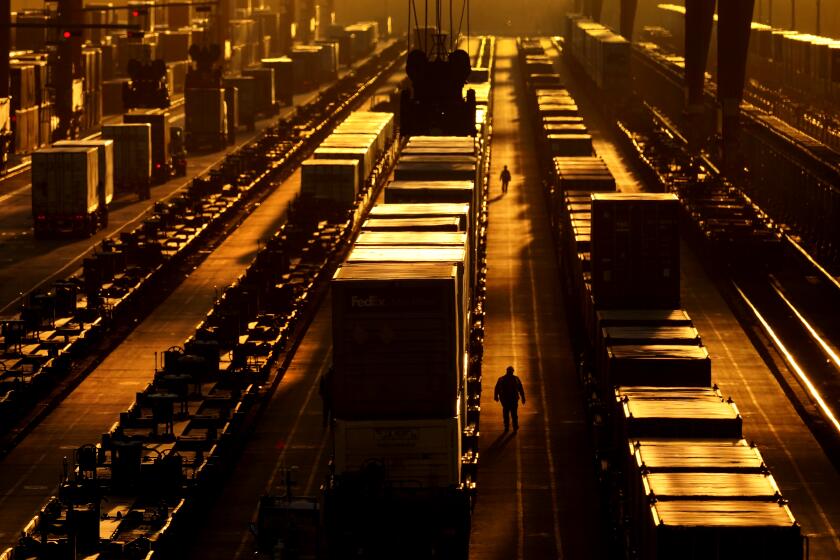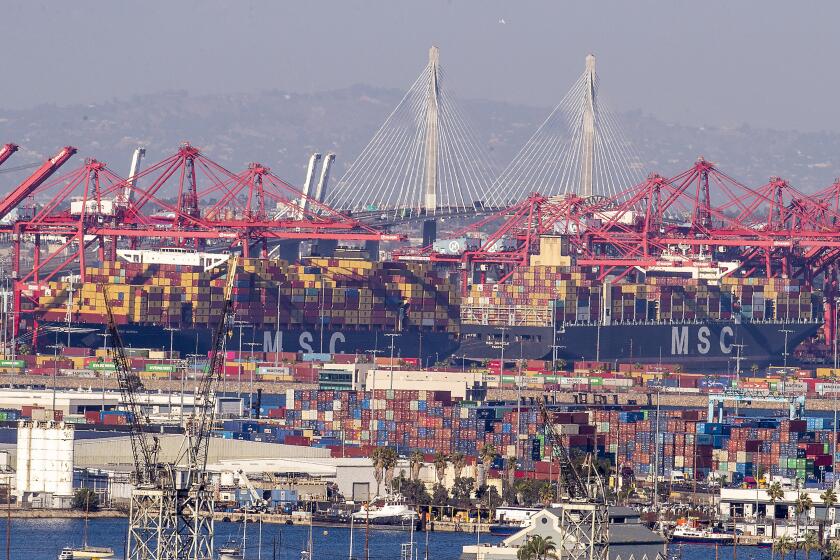Ports of L.A. and Long Beach brace for early arrival of peak cargo season

- Share via
The Port of Los Angeles, the United States’ busiest, is preparing for the early arrival of the 2022 peak season for cargo as retailers stock up on back-to-school and fast-fashion products despite high inventory levels, port Executive Director Gene Seroka said.
“The upstream orders coming from Asia — getting ready for an early arrival of peak-season goods — look strong; the June numbers will be very healthy,” Seroka said in an interview with Bloomberg on Friday. He added that the port handled just under 970,000 units of cargo in May, making it the third-busiest month on record.
Retailers have been building up inventories amid soaring consumer demand and transportation bottlenecks, but many, including Target Corp. and Walmart Inc., are trying to figure out how to sell all the products they already have as people shift to spending more on services over goods.
“The cargo keeps going because the consumer keeps buying. Those inventory levels have to be built up across a wide spectrum of retailers and importers,” Seroka said. The shipments due to arrive are not necessarily the products that are going to be looked at for discounting and pushing out, but are instead seasonal goods specific to the second half of the year, such as back-to-school items.
“What we’ll also see is cost-minded consumers looking for the necessary bargains to put food on the table for dinner. We may be buying hamburger instead of steak, beer instead of fine wines. We’re going to keep buying; our savings accounts are fairly high.”
President Biden visited the port Friday to highlight the White House’s push to smooth out the supply-chain crunches that have helped stoke the hottest inflation since 1981.
COVID-19 led to logjams at ports and borders that continue to ripple through many parts of our economy and everyday life. When will it get better?
The president and his administration have helped since last year to reduce massive backlogs at the twin ports of Los Angeles and Long Beach, which handle 42% of cargo shipped by container in trade with Asia. The gateways have been bracing for an earlier-than-normal peak season, which usually starts in July ahead of the holiday season.
The easing of port congestion in Shanghai is expected to unleash a wave of containers arriving on the U.S. West Coast that could clog supply chains further.
This year, it’s likely to coincide with what some port chiefs say will be an increase in cargo arrivals that had been held back from the U.S. because of COVID-19 lockdowns in Shanghai and surrounding areas, as well as the expiration of labor contracts for 22,000 dockworkers across 29 ports in California, Oregon and Washington.
The ILWU, the union representing dockworkers across the West Coast, is at the bargaining table with the PMA, the group representing shipping companies. The current contract expires on July 1.
Seroka has said cargo flows from China have been consistent despite the lockdowns, with freight moving through the Yangshan and Ningbo ports while Shanghai operations were shuttered.
Los Angeles “did not see the precipitous drop in cargo that some observers had called for — the ports and central government had prioritized this long haul cargo coming to Los Angeles, the Southern California ports,” Seroka said. “And now we’re starting to see just a little bit of an uptick, which are the peak-season goods.”
The L.A. port chief said dockworkers and employers are unlikely to reach a new contract by the expiration of the current one on July 1, but both sides have committed to keep operations running.
“They’re going to continue to work as hard as they can at the table while everyone is out moving cargo,” Seroka said, adding he doesn’t see a strike in the cards. “We don’t want any disruptions to the American supply chain.”
Bloomberg reporters Alix Steel, Ed Ludlow and Tom Mackenzie contributed to this report.
More to Read
Inside the business of entertainment
The Wide Shot brings you news, analysis and insights on everything from streaming wars to production — and what it all means for the future.
You may occasionally receive promotional content from the Los Angeles Times.












